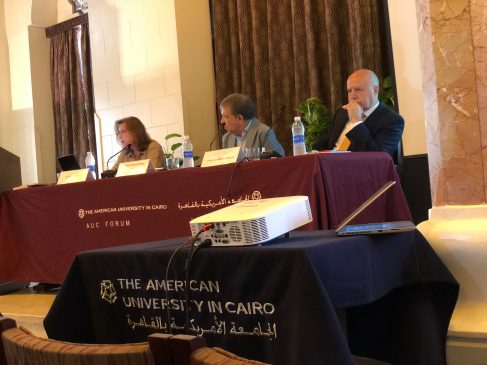Camp David 40 Years Later
The 1978 Camp David Accords, which ended a state of war between Egypt and Israel, have proven over the course of the past 40 years to be among the most divisive geopolitical issues in the region.

Egyptian President Anwar Sadat and Israeli Prime Minister Menachem Begin signed two peace agreements on September 17, 1978 at the Camp David retreat, under the patronage of US President Jimmy Carter.
The agreement reshaped the Middle East but also led to Egypt’s (temporary) expulsion from the Arab League.
AUC Forum, which explores global policy issues, hosted a number of Middle East experts to discuss the relevance of
the Accords 40 years later.
As a special commemoration of the anniversary, Carter wrote a letter to the Forum describing the peace initiative as a “bilateral understanding between Egypt and Israel”, which mainly called for Israeli withdrawal from the Sinai Peninsula and for Israel to give Palestine self-governance over the West Bank and Gaza.
Carter and his advisers spent 13 days in in an attempt to create a “framework for peace in the Middle East.”
“At times I have been optimistic that peace between Israelis and Palestinians was within their grasp. But, sadly the
situation today makes optimism very difficult,” wrote Carter in his letter to the forum.
The Accords required Israel to return the West Bank and Gaza to Palestinian control, but this was never implemented, and indeed forgotten.
There was also a disregard for Egyptian concerns, obscured by the Sinai agreement.
Executive Director and Co-Founder of the Arab Reform Initiative Basma Kodmani reflected on the Camp David
Accords during a cab ride through the streets of Beirut.
The radio had just announced news of an Israeli attack near Damascus airport in Syria.
“What came back and seemed as alive as 40 years ago is the need and the necessity for the Arab world to maintain an offensive posture vis-a-vis Israel,” said Kodmani.
As the 1970s came to an end and for much of the 1980s, many Egyptians and Arabs were angered by the Camp David Accords.
At the time, many questioned Sadat’s ties to Israel, with many conspiracy theories gaining popularity that he had betrayed the Arab cause.
For Ashraf El Sherif, a professor of political science and history at the American University in Cairo, the only benefit of the agreement was regaining control of Sinai.
But is Sinai really under full Egyptian sovereignty, some in the audience asked.
“I personally believe that Camp David was not efficient but it was the only solution to gain back our land, however, in reality it is not ours completely as our army isn’t allowed to be there and only US troops can be in the area,” said Petroleum Engingeering major Nermin Faragalla after the lecture.
“The field of political science in Egypt is very vague because there is not enough information on which to build accurate political analysis,” said El Sherif.
To this day, Arabs and Egyptians have differing points of view on the Accords, with some questioning what the Arab World has gained since.
“I am not sure what would have happened if there was no Camp David,” Professor of Peace and Development at the University of Maryland Shibley Telhami told the Forum.
“Egypt did avoid wars that could have been devastating and we need to keep that in mind when looking at the bigger picture.”
In his 1992 Political Science Quarterly article “Evaluating Bargaining Performance: The Case of Camp David,” Telhami asserts that Israel had the upper hand because of their more effective negotiating skills.
“I have argued that Israeli bargaining behavior at Camp David corresponded more closely to effective bargaining than did that of Egypt or the United States and that this deviation seems to correspond to differences in the system of government and leader personalities.”
Despite the reservations of some in the Middle East, the Accords led to the signing of a full Egypt-Israel Peace Treaty at the White House between the three leaders on March 26, 1979.



